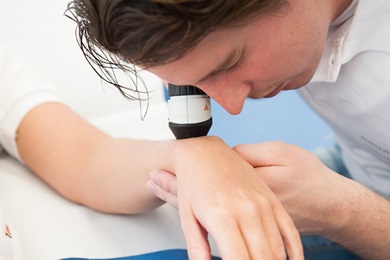Spot skin cancer
Melanoma, basal cell carcinoma and squamous cell carcinoma are the three most frequently found forms of skin cancer. All three types can be found in many different forms. Melanoma often presents itself as a pigmented area with color variation. It is asymmetrical with an irregular border. A melanoma is often wider than 5 mm in diameter. The key term to spot skin cancer basal cell carcinoma is translucency. A basal cell carcinoma mostly has a pearly translucency to flexy color. It is also characterized by tiny blood vessels on the surface, and in some cases ulceration can be found. Squamous cell carcinoma can be detected as a red, crusted bump or scaly patch. It is in most cases a very rapidly growing form of skin cancer. Sun light (UV light) is in most cases the cause of the formation of skin cancer. Some factors that enlarge the risk on developing skin cancer are therefore sunny vacations, residency in a country near the equator and a profession that is performed outside. In the case of melanoma, this type can also be inherited. A dermatologist will always check whether other members of the family have been diagnosed with melanoma.
Treatment of skin cancer
Depending on the type of skin cancer, the treatment varies as well. href=”https://www.rooseveltkliniek.nl/informatie/dermatologie-2/oncologie/”>see here for more information in Dutch. in some cases of basal cell carcinoma, the treatment is composed of a topical cream. Most of the time, however, it is necessary to perform excision to remove skin cancer. One of the advantages of the excision of skin cancer is that a pathologist can check whether the lesion is removed entirely. After removing the lesion, it is necessary to perform an extra excision around the scar, in accordance with the Dutch guidelines for the treatment of melanoma. All dermatologists in the Roosevelt clinic are experienced and well trained dermatological surgeons.
Costs for skin cancer check in the Roosevelt clinic
Once you’ve been referred to the Roosevelt clinic by your general practitioner, the costs of the check will be covered by your health care insurance. If you wish to get checked on skin cancer without a referral, this is also possible. However, the costs in that case are for your own account. If the dermatologist observes anything suspectible, he/she will inform you directly. By removing the lesions surgically, a pathologist can perform additional research. This second step will bring extra costs, however. For a pricelist check here or ask your dermatologist what the cost will be. If treatment turns out to be necessary, it is highly advisable to get a referral from your general practitioner.
Make an appointment with the dermatologist, click here.
